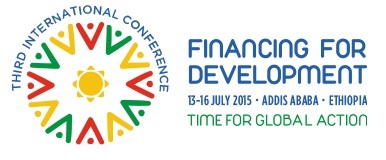At a side event to the second drafting session on the outcome document of the Third International Conference on Financing for Development (FfD 3), panelists discussed how evidence-based, inclusive, and integrated policy planning efforts might be used as a means of implementation for the Sustainable Development Goals (SDGs) in the post-2015 development agenda..
The event brought together civil society, UN system, and Member State institutions interested to learn about such assessments.
 14 April 2015: At a side event to the second drafting session on the outcome document of the Third International Conference on Financing for Development (FfD 3), panelists discussed how evidence-based, inclusive, and integrated policy planning efforts might be used as a means of implementation for the Sustainable Development Goals (SDGs) in the post-2015 development agenda.. The event brought together civil society, UN system, and Member State institutions interested to learn about such assessments.
14 April 2015: At a side event to the second drafting session on the outcome document of the Third International Conference on Financing for Development (FfD 3), panelists discussed how evidence-based, inclusive, and integrated policy planning efforts might be used as a means of implementation for the Sustainable Development Goals (SDGs) in the post-2015 development agenda.. The event brought together civil society, UN system, and Member State institutions interested to learn about such assessments.
The event took place on 14 April 2015, at UN Headquarters in New York, US. It was hosted by the Permanent Missions of Benin, the Republic of Korea, and Switzerland, along with the Biovision Foundation, the Millennium Institute, and the Sustainable World Initiative.
Elliott Harris, UN Environment Programme (UNEP), who moderated the session, explained that the post-2015 development agenda requires a more integrated approach to policy-making, including integration across line ministries and different stakeholders responsible for implementing the agenda, in order to achieve co-benefits across issue areas.
Paul Ladd, UN Development Programme (UNDP), said the Millennium Development Goals (MDGs) were “a product of their time,” and their sectoral nature, focus on social issues, and simplistic model defined a former development paradigm. With the post-2015 development agenda and the Sustainable Development Goals (SDGs), he said the process for defining the agenda and its content has been much more integrated and engaging. Ladd added that the UN system is redefining how it will support countries’ development initiatives, focusing on mainstreaming the agenda at the local level, accelerating progress, and providing policy support in a more accessible way.
Rosanna Marie Neil, Sustainable World Initiative, emphasized the importance of natural resources to sustainable development. She called on each country to monitor its supply and usage of natural resources in order to make sure it is on a sustainable path. Neil said the same attention that is paid to financial assets should be directed toward natural assets.
Matteo Pedercini, Millennium Institute, presented on his organization’s tools for integrated multi-stakeholder analysis of the SDGs. He said efficient, adaptive planning tools can enable actors to understand how much to invest, when to do so, and what issues to prioritize. He stressed the concept of integration that had been highlighted by many panelists, and explained that with an integrated simulation model for SDG progress, the world could gain a better understanding of the interaction between issue areas and reach a more coherent model of the future.
Jean-Francis Zinsou, Permanent Representative of Benin, discussed the priorities of the Least Developed Countries (LDCs), which include: capacity for science, technology, and innovation, and building productive capacities in skilled sectors; and using official development assistance (ODA) in a catalytic way to increase confidence in LDC economies.
Hahn Choong-Hee, Permanent Mission of the Republic of Korea, explained that multi-stakeholder assessments will encourage economic growth, democratization, governance, and the rule of law, which are all priorities for his country. He called for promoting development effectiveness on the demand side, and for the communication, participation, and partnership of stakeholders and the most marginalized.
Tatjana von Steiger, Permanent Mission of Switzerland, said multi-stakeholder assessments are needed for monitoring and tracking progress. She stressed that these assessments must be cross-cutting, have local ownership, and be linked to the international level.
Hans Herren, President of Biovision and the Millennium Institute, gave closing remarks. He encouraged the event’s participants to ask questions and request further information from the organizations now working on multi-stakeholder assessments, and for Member States to insert wording welcoming these assessments in the official outcome document of the post-2015 development agenda. [IISD RS Sources] [Millennium Institute Website] [Biovision Website]